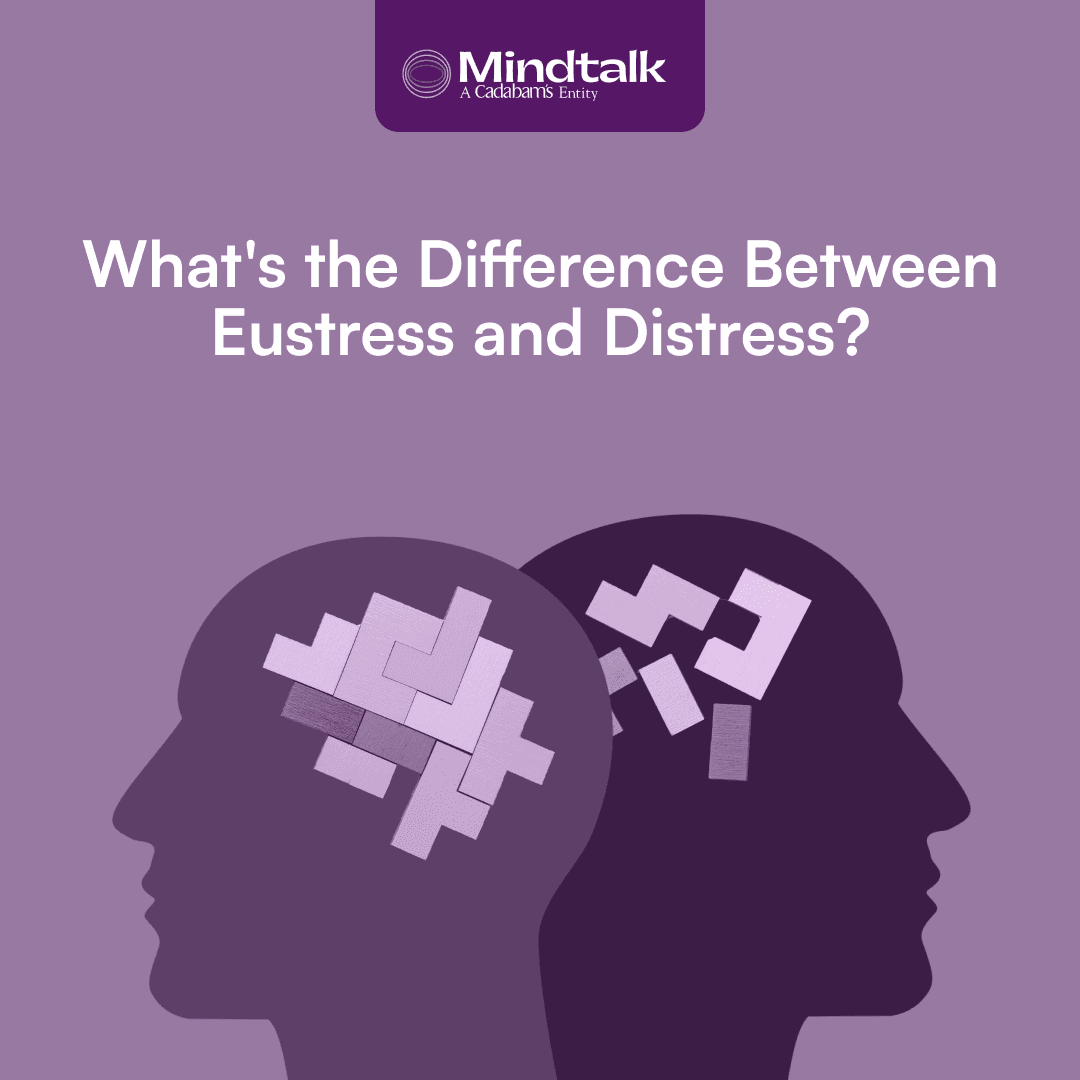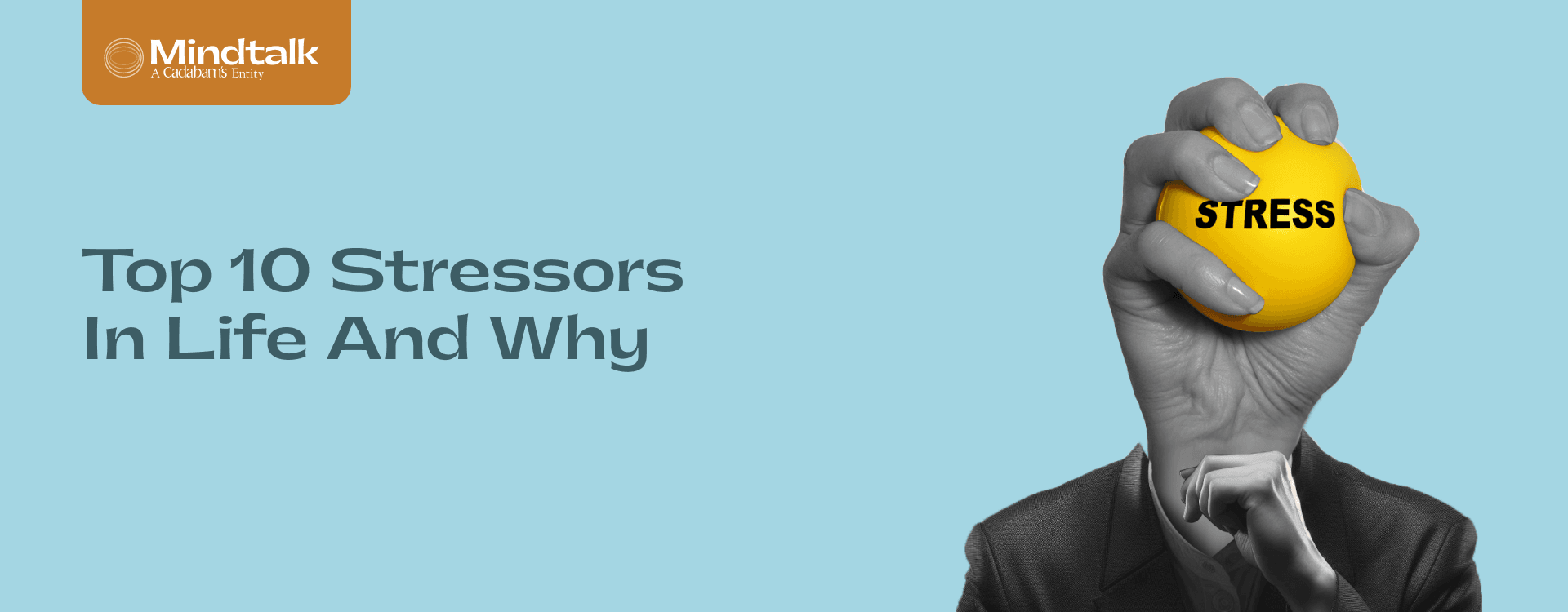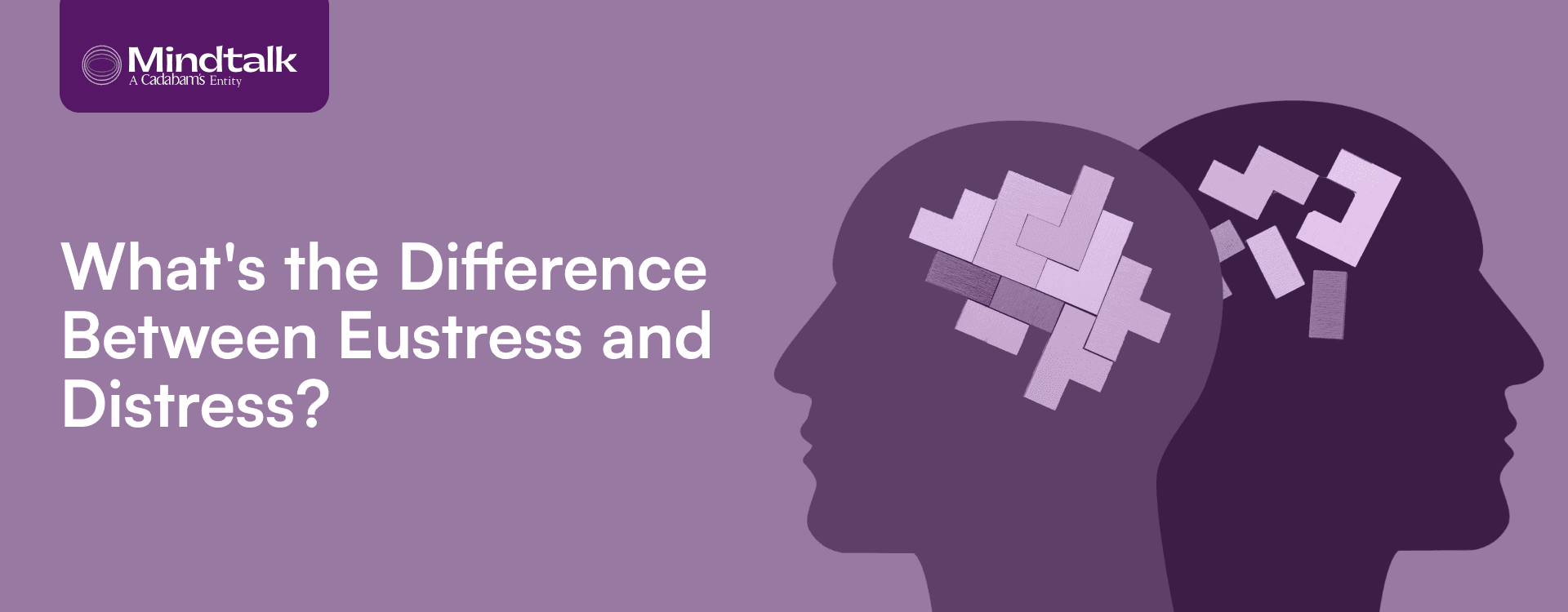Understanding the Difference Between Eustress and Distress
The word stress has a bad connotation stuck to it, but did you know that it also has a good side to it? Let’s look at what is the difference between Eustress and Distress and how to manage both sides of stress.

What Distinguishes Distress From Eustress?
Distress and eustress are different sides of the stress coin. What distinguishes distress from eustress, and how can recognizing this difference contribute to effective stress management? Understanding this distinction is key to harnessing the benefits of eustress while mitigating the harms of distress.
Exploring Distress: Characteristics And Effects
Distress is a gnawing feeling of unease that lingers on. Let’s delve into its characteristics, impact on your well-being, and common triggers.
What Is Distress? Understanding Its Nature
Distress, unlike fleeting stress, is a more prolonged and intense response to a perceived threat or challenge. It manifests as an array of emotional, cognitive, and physical symptoms, ranging from anxiety and sadness to fatigue and muscle tension. While normal in varying degrees, chronic distress can significantly impact your well-being.
The Impact Of Distress On Mental And Physical Health
Beyond the emotional toll of worry and sadness, distress can wreak havoc on your physical health. It disrupts sleep, weakens immunity, and exacerbates existing conditions like asthma or high blood pressure. Chronic distress can also increase the risk of mental health issues like depression, anxiety, and substance abuse.
Common Causes And Examples Of Distress
Life throws diverse curveballs, each triggering distress: work deadlines, financial strain, relationship conflicts, chronic illness, or significant life changes. Even seemingly positive events like weddings or promotions can bring the pressure of change and expectations. Recognising your unique triggers and seeking support are crucial steps to managing distress.
Exploring Eustress: The Positive Aspect Of Stress
Although it might sound like a lie, not all stress is bad! Let us introduce you to the term eustress; the "good" stress that can motivate, energise, and even propel you towards growth.
What Is Eustress?
Think of eustress as a healthy challenge, a spark that ignites motivation and growth. It's the stress that comes with learning a new skill, pursuing a goal, or tackling a stimulating project. Unlike distress, it feels manageable and exciting, fueling focus and positive energy.
Examples Of Eustress?
Have you ever felt the thrill of public speaking, the rush of learning a new dance move, or the satisfaction of tackling a challenging fitness goal? Those are all examples of stress! Stepping outside your comfort zone, pursuing a passion project, or competing in a healthy way can all trigger positive stress.
What Makes The Eustress Good Stress?
Eustress is "good" because it pushes you beyond your limits, encourages learning and growth, and boosts feelings of accomplishment. It activates your "fight-or-flight" response in a controlled way, enhancing focus, clarity, and motivation. When managed effectively, eustress can fuel creativity, improve performance, and lead a more fulfilling life.
What Is the Difference Between Eustress And Distress?
Now that we’ve understood that there are two different types of stress, let's look at the key differences between eustress (good stress) and distress (bad stress) to navigate them effectively and unlock the power of positive challenges.
Eustress vs Distress. Psychological And Physical Differences
Eustress: Feels manageable, exciting, and motivating. Boosts energy, focus, and feelings of accomplishment. Physically, it raises heart rate and cortisol but in a controlled way.
Distress: Feels overwhelming, anxiety-inducing, and draining. Triggers negative emotions and impairs focus. Physically, it leads to chronic muscle tension, fatigue, and weakened immunity.
Recognising the difference between Eustress vs. Distress is key to managing stress effectively. Eustress motivates and energizes, while distress overwhelms and harms. Understanding this distinction helps you harness the positive effects of eustress and mitigate the negative impact of distress.
What Is The Difference Between Eustress And Destress ?
Listen to your body and mind! Does the challenge energise or deplete you? Does it fuel motivation or paralyse you with worry? Eustress feels temporary and manageable, while distress feels persistent and overwhelming. Recognise your triggers and adjust your approach to reap the benefits of eustress and minimise the impact of distress. Understanding what is the difference between Eustress and Distress can guide you in identifying these triggers.
Managing Both Types Of Stress: Strategies And Tips
Managing Eustress vs. Distress—both types of stress—is important, so let’s explore the most effective strategies and tips to manage both, which should eventually help you harness the good and minimize the bad (stress, that is).
Understanding And Identification
Learn to recognise the signs of eustress (motivation, focus) and distress (anxiety, exhaustion). Reflect on situations that trigger each and how your body and mind respond. This self-awareness empowers you to choose appropriate coping mechanisms.
Healthy Lifestyle Choices
Fuel your well-being! Prioritise sleep, healthy eating, and regular exercise. These provide the foundation for resilience against both eustress and distress. Limit caffeine and alcohol, as they can exacerbate anxiety and disrupt sleep.
Mindfulness And Relaxation Techniques
Practices like meditation, deep breathing, and yoga can calm the mind and body, reducing both stress and distress. Explore activities that resonate with you, whether it's spending time in nature, listening to calming music, or engaging in hobbies you enjoy.
Setting Realistic Goals And Boundaries
Setting realistic goals and saying "no" when needed helps manage stress and prevent it from becoming overwhelming. Establish healthy boundaries in your personal and professional life to create space for rest and rejuvenation, preventing distress from taking hold.
What is the Difference Between Eustress and Distress?
Eustress is positive stress that energises and motivates you to perform well like before an exam or big presentation. In contrast, distress is negative stress that feels overwhelming and harmful, often linked to anxiety and burnout. Understanding this difference is key to healthy stress management and mental well-being.
Key Characteristics of Eustress vs. Distress
Understanding how eustress and distress differ helps in building resilience and choosing the right coping strategies. Here's a quick comparison:
Eustress (Positive Stress):
- Boosts motivation and energy
- Short-term and manageable
- Improves focus and performance
- Leads to personal growth
- Feels exciting or empowering
Distress (Negative Stress):
- Causes anxiety, tension, or fatigue
- Can be short or long-term
- Disrupts daily function and focus
- Reduces well-being and resilience
- Feels overwhelming or draining
How Understanding Eustress vs. Distress Impacts Mental Health
Recognising the difference between eustress and distress plays a key role in protecting your mental health. Eustress supports resilience. It pushes you to grow, stay focused, and feel energised. In contrast, unmanaged distress can lead to burnout, anxiety, or even long-term emotional exhaustion.
By identifying which type of stress you're experiencing, you can apply the right coping strategies from reframing challenges to seeking support improving your overall mental well-being and stress response.
Stress Management Techniques for Eustress and Distress
Managing stress isn't about eliminating it—it's about using it wisely. With eustress, the goal is to sustain motivation without tipping into overload. For distress, it’s about reducing intensity and restoring emotional balance.
For Eustress:
- Break large goals into smaller, achievable tasks
- Practise mindfulness to stay present and focused
- Use positive self-talk to maintain momentum
For Distress:
- Avoid suppressing emotions—talk to someone you trust
- Identify early signs of burnout and slow down
Replace unhealthy coping (e.g., overworking or substance use) with supportive habits like journaling or exercise
Use these coping mechanisms to build resilience and turn stress into a source of growth.
Coping Strategies for Managing Stress
Effective stress management involves recognising whether you're dealing with eustress or distress, and choosing the right tools accordingly. Here are some coping strategies that support mental wellness across both types of stress:
- Mindfulness practices (e.g., breathing exercises, guided meditation)
- Cognitive reframing to shift negative thought patterns
- Physical activity like walking, yoga, or cardio to release tension
- Rest and sleep hygiene to promote recovery and focus
- Social support from friends, family, or a therapist
- Goal-setting techniques to turn challenges into motivation
- Journaling and self-reflection to process emotions
Whether you’re aiming to enhance eustress or reduce distress, these techniques can help build resilience and support long-term mental wellness.
Positive vs Negative Stress: Impact on Well-being
Not all stress is harmful. Positive stress (eustress) can energise and motivate you—helping you meet deadlines, take on challenges, and grow. In contrast, negative stress (distress) can drain your energy and impair mental and physical health.
Positive and Negative Stress Effects on Performance
Eustress sharpens your focus, fuels determination, and improves creativity—especially when facing a deadline or a new challenge. It enhances performance by helping you stay alert and energised.
In contrast, distress impairs your performance. It can disrupt executive function, reduce concentration, and trigger impulsivity or mental fatigue. Over time, unmanaged distress may lead to burnout, anxiety, or emotional shutdown.
Think of eustress as a motivating push.
Think of distress as a paralyzing pull.
By recognising which type of stress you’re experiencing, you can take appropriate action to sustain productivity and protect your mental health.
How to Turn Distress into Eustress
Not all stress is harmful—sometimes, reframing the situation can make all the difference. By shifting your mindset and using healthy strategies, you can transform distress into eustress.
Here’s how:
- Reframe the challenge as an opportunity for growth, not threat.
- Break down overwhelming goals into manageable steps to reduce pressure.
- Use stress as a motivator—channel that energy into focused action.
- Practice cognitive strategies like positive self-talk and reframing negative thoughts.
- Build resilience through habits like mindfulness, rest, and social connection.
With the right tools and mindset, distress can become a powerful catalyst for personal growth, performance, and well-being.
Balancing Eustress And Distress For A Healthier Life With Mindtalk
At Mindtalk, we empower you to manage your stress, both good and bad, and reap all the benefits that come with it! Our expert-led programs, personalised guidance, and supportive community equip you with the tools and knowledge to navigate stress effectively. Learn to identify your triggers, develop healthy coping mechanisms, and cultivate resilience for a calmer, more balanced life. Don't let stress hold you back - take control of your well-being today. Visit Mindtalk today!
The 4 Types of Stress & How They Affect You
Not all stress is bad! Some types push you forward, while others wear you down. But how do you tell the difference? In this video, we'll break down the four types of stress—Acute, Episodic, Chronic, and Eustress—and how each one impacts your body and mind. Understanding your stress is the first step to managing it!
Mental Health Professional For Stress




